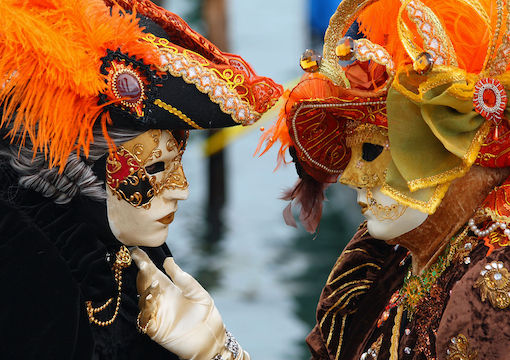
February 13, 2020

Source: Wikimedia Commons
Thanks to a historic acqua alta (high tide) and the global hysteria of the coronavirus, tourist reservations in Venice have decreased by 30%. What a great time to go!
In addition, the violin of Il Prette Rosso, Antonio Vivaldi, is mixed with the Cuban salsa of Celia Cruz, because we are in carnival (when are we not?), and each one adopts the costume that suits him best. It is a matter of fascination.
Only cretins despise the value of masks. The term “person” in Latin means “mask” (where the voice comes from), with which we could say—at least classically—that we are a bunch of actors representing a play throughout our lives.
That could reduce psychology to imposture.
If we continue this transgressive reasoning, it is only in carnival that we dare to be ourselves. I don’t work; I play. Pay attention to the costumes of your friends and you will see something of the true self that they keep hidden behind the surface of their personality. But don’t ask for accounts! What is seen in carnival is like a recess in the totalitarian school and only tattletales go to hell.
Carnival is a social escape valve, the dancing stampede of the internal demons, the temporary opening of the Pandora’s box of the subconscious. It is the carrus navalis, the naval chariot mounted by solvent Dionysus (long live Bacchus!), associated with the ideas of orgy and disorder, a violation of reason and duty, which are dominated by appetites and sensuality.
As Paul Morand wrote in Venices: “At the end of the slope of the thighs, so easy to descend, the unctuous cone….” And the sensual wisdom of carnival transforms such a slope into a jubilant slalom.
In Venice the masquerade is artistic and one gets the tone with a negroni (the good one has a reddish color proper to Titian!), which is an aperitif cocktail that mixes gin, Campari, and red vermouth in equal parts. It goes well for carrying the horns with dignity, as tradition dictates that couples cannot be held accountable for carne-vale days. As good schemers, Venetians know that noble loyalty is much more important than jealous fidelity.
It is more fun to dare to transgress the social order and dance like a dervish than to lie on the couch of a psychoanalyst and talk for hours about a sexual complex. Henry Miller already said that every time a taboo is violated, something stimulating happens.
And then there are the geniuses, like Giacomo Casanova, who knows that carnival lasts a lifetime: “Nothing can take away from the fun I had.”
(The article in its original Spanish immediately follows.)
La Vida Es un Carnaval
Gracias a una histórica acqua alta (marea alta) y a la histeria globalizada del coronavirus, las reservas turísticas en Venecia han disminuido un 30%. ¡Qué gran momento para ir!
Además los violines del prete rosso Antonio Vivaldi se mezclan con la salsa cubana de Celia Cruz, pues estamos en carnaval (¿alguna vez no lo estamos?) y cada cual adopta el disfraz que mejor le conviene. Es una cuestión de fascinación.
Solo los cretinos desprecian el valor de las máscaras. El término “persona” en latín quiere decir “máscara” (por donde sale la voz), con lo cual podríamos decir—al menos clásicamente—, que somos una panda de comediantes representando un teatro a lo largo de la vida.
A eso podría reducirse la psicología: al campo de la impostura.
Si continuamos el transgresor razonamiento es solo en carnaval cuando nos atrevemos a ser nosotros mismos. Prestad atención a los disfraces de vuestros amigos y veréis algo del verdadero yo que mantienen oculto tras la superficie de su personalidad. Pero ¡no pidáis cuentas! Lo que se ve en carnaval es como un recreo en el colegio totalitario y los chivatos son los únicos que van al infierno.
El carnaval es pues la válvula de escape social, la estampida danzante de los demonios internos, la apertura temporal de la Caja de Pandora del subconsciente. Es el carrus navalis, el carro naval que monta el disolvente Dionisos (¡Viva Baco!), asociado a las ideas de orgía y desorden, la violación de la razón y el deber, que son dominados por los apetitos y la sensualidad.
Tal y como escribía Paul Morand: “Al final de la pendiente de los muslos, tan fácil de descender, el cucurucho untuoso….” Y la sabiduría sensual del carnaval transforma tal pendiente en un jubiloso eslalon.
En Venecia la mascarada es artística y uno se pone a tono a base de Negroni (el bueno tiene un color rojizo propio de Tiziano), que es una copa de aperitivo que mezcla ginebra, campari y vermut rojo a partes iguales. Va bien para llevar la cornamenta con dignidad, pues la tradición manda que las parejas no pueden pedirse cuentas por los días de carne-vale. Y como buenos intrigantes, los venecianos saben que la noble lealtad es mucho más importante que la celosa fidelidad.
Resulta más divertido atreverse a transgredir el orden social y bailar como un derviche giróvago, que tumbarse en el diván de un psicoanalista y hablar durante horas de algún complejo sexual. Ya decía Henry Miller que cada vez que se viola un tabú, sucede algo estimulante.
Y luego están los genios, como Giacomo Casanova, que saben que el carnaval dura toda la vida: “Nada podrá hacer que no me haya divertido.”